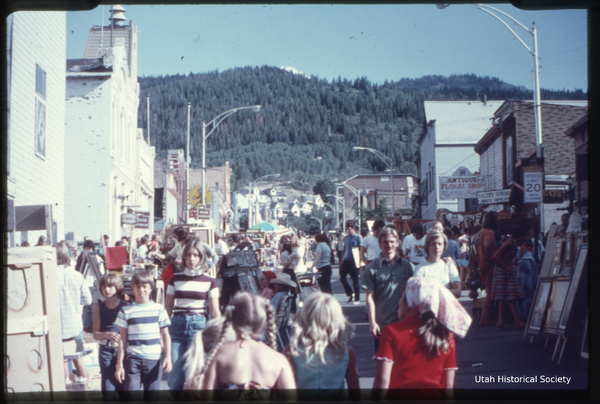Dublin Core
Title
Description
Park City’s population rapidly changed during the counterculture movement of the 1960s, causing friction among the city’s old-timer residents and newcomers. One major cause of change in the town was the shift from a mining industry to one based on skiing and tourism. In 1963, Park City mayor William P. Sullivan oversaw the opening of a new ski resort, Treasure Mountain, and the influx of tourists began to cause problems.
To some longtime Parkites, newcomers all fit under the category of “hippie,” which carried a negative connotation at the time. One writer lamented in a 1969 edition of the local Park Record newspaper that hippies ran “naked through the streets playing flute while under the influence of drugs.” A high school student countered with another letter, writing “tell me, how are hippies stopping you from lending a helping hand?” The conflict over hippies in Park City was about more than resistance to the nation’s growing counterculture. It reflected a deeper concern that “old Park City” would disappear with cultural and economic change.
Mayor Sullivan captured this anxiety in his Fourth of July Proclamation in 1971. He called on Parkites to address current challenges, including “restless youth” and “the sapping of our country’s moral strength.” Perhaps unexpectedly, the tension that Sullivan described escalated into a “hippie riot” on Main Street. As Parkites gathered along Main Street for the traditional Independence Day parade, a group of “hippies” sitting on a roof threw water balloons into the crowd, hitting a miner’s wife. A fight between miners and hippies then started. Park City Police Officer John Bircumshaw intervened after a water balloon hit his car. Three people jumped Bircumshaw, and the brawl grew to more than five hundred people. The bars began to empty, with new residents pouring into the eastern side of Main Street and longtime residents on the western side.
Some observers later contested the term “riot,” saying they had seen more intense fights at high school football games. Nevertheless, roughly thirty law enforcement officers responded before the holiday brawl ended. The fight between old and new, however, persisted as the Park City community managed the drastic transition from mining to skiing.
Creator
Source
_______________
See Blair Feulner, “Real Fireworks,” Park City Magazine, Summer 2010; “High School Students’ Critiques Comment on Mad Citizen’s Letter,” Park Record, September 18, 1969, accessed via Utah Digital Newspapers; “Long-Time Resident of Park City Resents Flower Children Inroads,” Park Record, September 4, 1969, accessed via Utah Digital Newspapers; “Proclamation Marks July 4,” Park Record, July 1, 1971, accessed via Utah Digital Newspapers; “Street Fight Mars Independence Day in Park City—Officers Put Down Riot Threat at Resort Area,” Salt Lake Tribune, July 6, 1971, accessed via Utah Digital Newspapers; David Chaplin, Interview by Lola Beatlebrox, July 29, 2004, Park City Research Center, Park City, UT, transcript.

